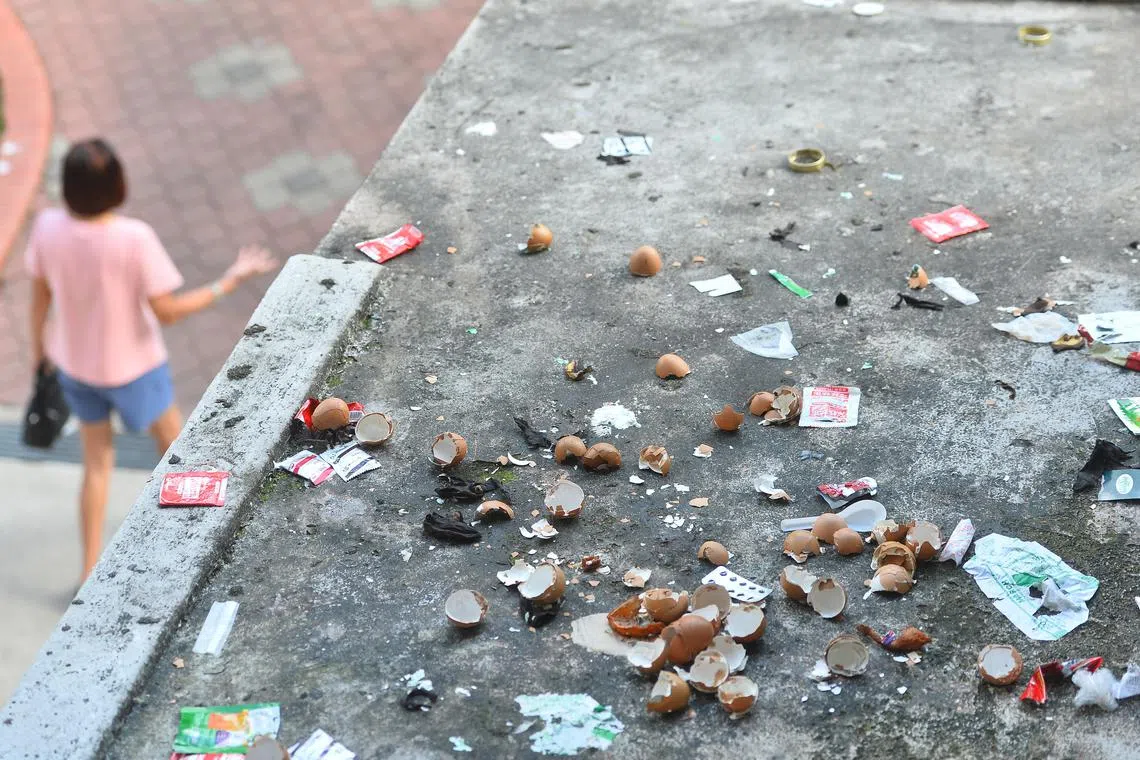askST: How will the proposed new law affect home owners linked to high-rise littering?
Sign up now: Get ST's newsletters delivered to your inbox

Home owners and tenants will need to show proof they did not commit high-rise littering offences with 14 days of being notified, under a new Bill.
PHOTO: SHIN MIN DAILY NEWS FILE
SINGAPORE - A new Bill introduced in Parliament on Monday paves the way for home owners and tenants to be convicted over litter thrown from their flats
The Straits Times summarises the National Environment Agency’s (NEA) response to concerns about the proposed change.
1. What if the owner or tenant of a flat linked to littering cannot respond within the 14 days of being required to do so?
If the presumed offender missed the letter of intended prosecution, he may contact NEA and give evidence on why he did not respond to the letter.
Such evidence includes air tickets and boarding passes to show that he was overseas at the time.
NEA will assess the representation and, if accepted, withdraw the summons issued.
2. Will the new law apply to children, the elderly or people who are mentally or physically disabled?
No enforcement action will be taken against children under 12. Instead, an advisory will be sent to their parents to educate the children on how to dispose of litter correctly and refrain from littering.
Offenders who are elderly or from vulnerable groups, as well as their family members or relatives, may write to NEA and provide relevant supporting documents of their age or circumstances.
NEA will then review and consider each case before taking any action, which may include issuing a warning.
3. What if NEA accuses the wrong person of high-rise littering?
The presumption of guilt applies only when it is proven, such as through investigations and in court, that the littering occurred from that residential flat.
During investigations, NEA will ask the owner or tenant questions, including whether he was present in the flat when the offence was committed.
Even if the owner or tenant provides information on the identity of the offender, this does not automatically mean that the named person will be prosecuted for the offence. As is the case with current processes, NEA will investigate the information provided.
4. What if the owners of a flat linked to littering show that one of the rooms is being rented out?
In such cases, the owner will still be the presumed offender.
However, the owner or tenant can rebut this by proving that he was not present in the flat at the time of the offence or that he could not have been the offender, or by providing the identity of the person who could be the offender, to NEA within 14 days of being required to do so.
Depending on the information provided, NEA will conduct further investigation to determine the identity of the offender.
5. Who will NEA act against if litter is linked to a flat with multiple owners?
Every registered owner of a residential flat will share equal responsibility when a littering act is proven to have been committed from the flat. The same applies to tenants in the event that the whole residential flat is leased.
They will be given the opportunity and time in the investigation to prove that they did not commit the offence.
6. Will the new legislation, including the presumption clause, apply to private apartments such as condominiums?
The presumption applies if litter is thrown from a private apartment that is used for residential purposes and if the litter lands in a public place.



